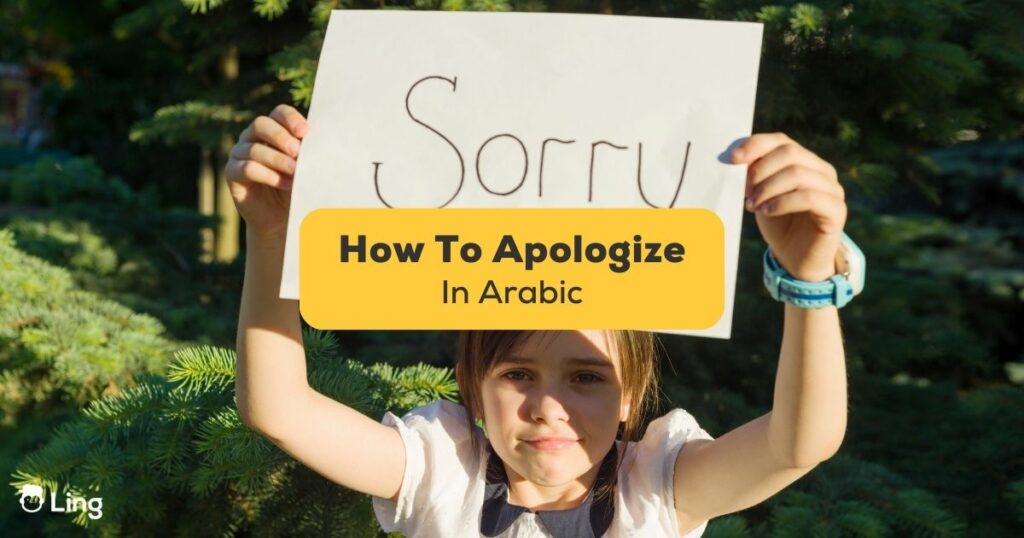We are all humans, and we sometimes make mistakes. That’s natural. But being human also means own up your mistake and say sorry without giving excuses. And if you are traveling to another country and spending your days among local people in a new and different culture than yours, then it becomes really important to sincerely apologize, especially when in a foreign country. That’s why you should learn how to apologize in Arabic.
If you’re learning the Arabic language, you might already know that the word for sorry is آسف (aasif) but there are many more expressions you can use. We’ll be covering 10 of them in this post, so let’s get right to it!
Express Apology In Arabic
Here are some ways in which you can extend your sincere regret and apologize to Arabic speaking people.
1. I’m Sorry – Ana Aasef (أنا آسف)
This expression is a simple and widely used way to express a simple “I’m sorry.” It fits both formal and informal situations, making it a versatile phrase to express regret.
2. Sorry – Aasifah (آسفة) / Aasif (آسف)
This apology is similar to the one above, but it’s gender-specific. As such, آسفة is used for women and آسف for men.
3. Excuse Me – Ma’zerah (معذرة)
This is a phrase often used to politely interrupt someone, similar to how we use “excuse me” in English. You can use it in different contexts, whether it is a formal admission of guilt or a polite interruption.
4. Sorry For Being Late – Aasif ‘Ala At-Ta’Kheer (آسف على التأخير)
These are the words you can use when you have to apologize for being late. They reflect a sense of responsibility and consideration for the impact your tardiness may have had on others.
5. Forgive Me – Samiḥni (سامحني)
You can use this phrase when you want to apologize in the right tone. It’s appropriate for situations where a high degree of consideration is desired, such as when apologizing to an authority figure in a professional setting.

6. I Hope You Forgive Me – Ana Amal An Tasamahni (أنا آمل أن تسامحني)
This expression adds a hopeful tone to your apology, expressing not only regret for the action but also a genuine wish for forgiveness.
7. I’m Very Sorry – Muta’Assef Jiddan (متأسف جداً)
When a simple apology is not enough, this phrase adds a bit of emphasis. It’s suitable for situations where a deeper level of regret needs to be conveyed, perhaps for bigger mistakes.
8. Sorry If I Have Bothered You – Aasif In Kunt Qad ‘Azaa’Ajtuk (آسف إذا كنت قد أزعجتك)
This expression is for when causing any bother or disturbance. It shows consideration for the other person’s feelings and acknowledges the possibility that your actions may have inconvenienced them.
9. I Apologize For Any Inconvenience – A’tathir ‘An Ayyi ‘Izaaj (أعتذر عن أي إزعاج)
You can also use this phrase in the Arabic language when you want to express regret for causing any inconvenience. It combines a formal apology with a commitment to minimizing any disruption or trouble caused.
10. I Was Wrong – Laqad Akhta’t (لقد أخطأت)
Eventually, when you feel that you were in the wrong, then it’s a good idea to own it up and extend a sincere apology. In that case, you can use this phrase. It reflects humility and a willingness to take responsibility for your actions. As such, it’s suitable for situations that require a more serious acknowledgment of wrongdoing.
How To Apologize In Arabic: More Phrases
As we said, there are many ways to apologize in Arabic. Here are some more basic Arabic phrases to do so.
Accepting An Apology In Arabic
Now that you know how to apologize in Arabic, if you want to say that you forgive someone or accept their apology, you can use these expressions.
Wrapping Up
In this article, you’ve learned how to apologize in Arabic, and also how to accept when someone apologizes to you. From now on, it will be easier to express how sorry you are when you make a mistake or – God forbid – break someone’s heart.
If you want to learn Arabic in a fun and easy way, you should try the Ling app! Plus, don’t miss Ling’s Arabic blog! We share articles covering topics related to this language and culture!



































































